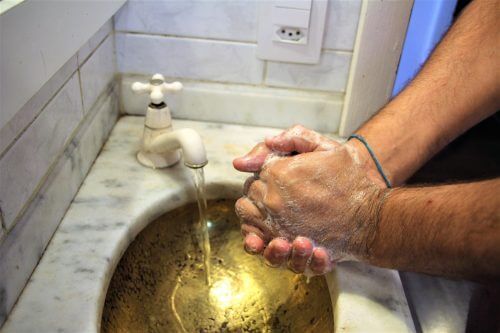The corona epidemic illustrates the role that scientists always have, but especially now, in explaining to the public how to live with uncertainty
By: Prof. Darren Saunders, University of New South Wales Australia UNSW. Translation: Ronit Meiri Peled

Watching the world adapt these days to a new and horrifying reality of the Corona epidemic, led me to reflect on a much more important lesson that we may be learning together as we face this crisis.
We were all forced out of our comfort zone, when the familiar pace of life we were used to was suddenly replaced by complete uncertainty. So many unanswered questions. So many experts with different opinions. Frustration from the fact that things don't work as we expected or thought they would and seeing the situation as infinite shades of gray instead of that comforting and familiar world of black and white.
Sound familiar? Welcome to the mind of a scientist.
Uncertainty is hard - but you can learn to live with it. When this feeling "fell upon me" many years ago, on one of my frequent and many morning trips to Canberra, trips to which I had become accustomed during my doctoral studies, it was an almost overwhelming feeling.
Digging deep into the mysterious depths of biochemistry and molecular biology, the ghost of life itself, could do that. This can be an incredibly challenging and even frustrating experience.
But I've learned to let that uncertainty wash over me. Just as the surfer cuts the waves while surfing in the sea, because the resistance only tires you and makes you worse. After swimming for a long time I just learned to float.
I even managed to catch a wave or two. I wonder, does this situation show us a potential way out of this through the viral trauma that surrounds us?
We are all faced with a lot of information and advice that changes quickly and what was true at 8 in the morning, will not necessarily be true at XNUMX in the evening.
The role of scientists at this time
Maybe scientists have another role besides the hard work currently being done to understand this new corona virus, the pursuit of finding new vaccines and drugs? We are comfortable swimming in the unfamiliar area and we know how to float in a sea of uncertainty. We know it's okay to say: "I don't know" or: "Good question".
Here is an opportunity for scientists to lead by example both in the way we act and in the way we communicate, to show us the way in dealing with uncertainty, changing information and appropriate responses. But we must start from a place of empathy. People are anxious and afraid and we have to recognize that. They want reliable information and clear advice that is based on the best available data and not preachy or condescending. Scientists should be aware that advice can change rapidly or sound slightly different from person to person.
Uncertainty and announcements to the public
As a society, we need to be more comfortable with the doubt and uncertainty that exists in the public, in politics and in business. I understand the transmission of public messages that reflect this situation. We are so used to politicians holding a certain line of thought on this or that issue, but the covid-19 crisis has shown that it doesn't really work when the situation is changing and dynamic. Maybe I'm more comfortable with the matter as a scientist. Politicians must definitely take this into account and should definitely give space to their positions to really develop with proven evidence.
We can change
Our sudden interest in hand sanitizers and hand sanitizers made me reflect on my early days in the research lab. Learning how to grow human cells without contaminating them with bacteria and yeast, or setting yourself on fire... requires some learning.
"do not touch it!"
"No! not like this!"
"why did you do this?"
No, keep it that way."
It's not intuitive. It requires real concentration. Our habits are deeply embedded in us and our memories are fixed. You have to delete everything and rewrite everything. It's hard and frustrating work. It feels like the entire planet is now sharing a similar experience, but the stakes are much higher. We can learn and change until what was once difficult and uncomfortable becomes second nature.
As a society, we have quickly become much better at handshake and cough etiquette and our relationship with uncertainty will have to change as well.
For an article in The Conversation
We would be happy to help with translations on a voluntary basis. Please contact the website editor Editor@hayadan.org.il
More of the topic in Hayadan:
The future of humanity in the light of the corona virus: three scenarios
The corona virus: three aspects in which the crisis may permanently change our lives
Will warm weather stop the spread of the corona virus?

One response
Until when will they produce faucets with a handle above the surface,
Drip and dirty to justify owning slaves
From the "disability type" population.